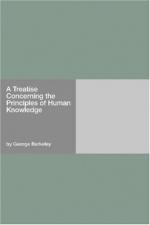139. But it will be objected that, if there is no idea signified by the terms soul, spirit, and substance, they are wholly insignificant, or have no meaning in them. I answer, those words do mean or signify a real thing, which is neither an idea nor like an idea, but that which perceives ideas, and wills, and reasons about them. What I am myself, that which I denote by the term I, is the same with what is meant by soul or spiritual substance. If it be said that this is only quarreling at a word, and that, since the immediately significations of other names are by common consent called ideas, no reason can be assigned why that which is signified by the name spirit or soul may not partake in the same appellation. I answer, all the unthinking objects of the mind agree in that they are entirely passive, and their existence consists only in being perceived; whereas a soul or spirit is an active being, whose existence consists, not in being perceived, but in perceiving ideas and thinking. It is therefore necessary, in order to prevent equivocation and confounding natures perfectly disagreeing and unlike, that we distinguish between spirit and idea. See sect. 27.
140. Our idea of spirit.—In a large sense, indeed, we may be said to have an idea or rather a notion of spirit; that is, we understand the meaning of the word, otherwise we could not affirm or deny anything of it. Moreover, as we conceive the ideas that are in the minds of other spirits by means of our own, which we suppose to be resemblances of them; so we know other spirits by means of our own soul—which in that sense is the image or idea of them; it having a like respect to other spirits that blueness or heat by me perceived has to those ideas perceived by another.
141. The natural immortality of the soul is A necessary consequence of the foregoing doctrine.—It must not be supposed that they who assert the natural immortality of the soul are of opinion that it is absolutely incapable of annihilation even by the infinite power of the Creator who first gave it being, but only that it is not liable to be broken or dissolved by the ordinary laws of nature or motion. They indeed who hold the soul of man to be only a thin vital flame, or system of animal spirits, make it perishing and corruptible as the body; since there is nothing more easily dissipated than such a being, which it is naturally impossible should survive the ruin of the tabernacle wherein it is enclosed. And this notion has been greedily embraced and cherished by the worst part of mankind, as the most effectual antidote against all impressions of virtue and religion. But it has been made evident that bodies, of what frame or texture soever, are barely passive ideas in the mind, which is more distant and heterogeneous from them than light is from darkness. We have shown that the soul is indivisible, incorporeal, unextended, and it is consequently incorruptible. Nothing can be plainer than that the motions, changes, decays, and dissolutions which we hourly see befall natural bodies (and which is what we mean by the course of nature) cannot possibly affect an active, simple, uncompounded substance; such a being therefore is indissoluble by the force of nature; that is to say, “the soul of man is naturally immortal.”




